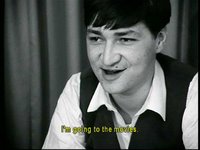Fassbinder's Whity
 Whity (1971) is one of the lesser known films of Rainer Werner Fassbinder, the prolific German director of no less than 43 films, 14 plays, 4 radio plays, and 24 cinema and television scripts, all created in a short career that lasted less than twenty years. (And what exactly have you been doing with your time?)
Whity (1971) is one of the lesser known films of Rainer Werner Fassbinder, the prolific German director of no less than 43 films, 14 plays, 4 radio plays, and 24 cinema and television scripts, all created in a short career that lasted less than twenty years. (And what exactly have you been doing with your time?)The ever modest Fasbinder once said, "I'd like to be for cinema what Shakespeare was for theatre, Marx for politics and Freud for psychology: someone after whom nothing is as it used to be." It's an outrageous claim but after seeing a few of his films (my favorites so far are The Bitter Tears of Petra von Kant and Fox and His Friends and Veronika Voss) I'd say he came pretty close. In my eyes, he has more right to make this claim than any other director.
Although they aren't for everyone, I find that the best Fassbinder films are objects of almost infinite interest, incredible tapestries of resonant images, layered sounds, multifaceted characters, whose inner lives seem to be just hinted at with the smallest and subtlest brush strokes of dialogue, but by the end they seem as rich and complex as real human beings. His films are so detailed and compelling that any element, any frame, an exchange of glances between characters, could be potentially held up, dissected, and discussed, the way certain academics can brilliantly analyze, say, Shakespeare's use of the word "cold" in the sonnets or such. His films are that detailed, that good.
Having said that, I'd have to classify Whity as one of his less accessible, less successful films (If you're new to Fassbinder I suggest starting with one of the movies I've listed above, with the caveat that his films aren't for everyone. They leave some people cold).
Fassbinder who loved playing with the genre film uses the tropes of the Hollywood western to tell the story of Whity, a black domestic servant in a detoriating rancher family in the old West. It's an opportunity for Fassbinder to examine his usual themes of domination, power, history, freedom and personal choice (He never thought small, by the way). As usual, he mixes and plays with genre: the European gothic, the Southern slave narrative and the Western (!) (Picture, if you will, an old buckaroo in a ten-gallon hat sauntering into a dirty saloon, sidling up to the bar and ordering "Ein vhisky, bitte!")
It's a mashing of elements that I think most American viewers--including myself--find hard to get a grip on, which may explain its lack of a larger reputation here. It's also a movie in which the major revelations, the character development and information, come dropping slow, which can be a challenge for audiences. Like a lot of Fassbinder films, it demands multiple viewings, but its themes of human cruelty, control and violence--coupled with its strange amalgamation of genres and B-movie Western movie imagery (among my least favorite in all of film history)--don't exactly make it the most inviting of his films to come back to. I did, however, end up taking a second look with Jeff who fell asleep the first time, and I appreciated it a lot more the second time around.
It's a fascinating piece of the Fassbinder oeuvre. (He almost always used the same group of actors--like Warhol's superstars--so it's interesting to see the same faces wearing new hats). But, in the end, in my opinion, it simply doesn't rank up there with his own strongest work.
FilmStock Rating: B+

0 Comments:
Post a Comment
<< Home